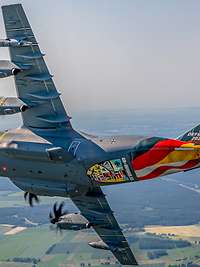
Air Defender 23
Multinational air operation exercise in Europe


The weather on Earth has an impact on military operations in the air – the effects of space weather have, too. For this reason, specialists of the Bundeswehr Space Command employed at the tactical air operations centre of the Air Defender 23 exercise ensure that mission personnel and aircrews are provided with the latest data from space.
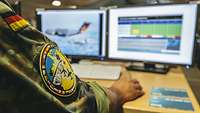
Thomas R. is preparing his daily space weather briefing at the JFACJoint Forces Air Component HQHeadquarters
Bundeswehr/Marvin Hofmann“Like nuclear power plants exploding on the surface of the Sun”, describes Lieutenant Colonel Thomas R. the effects of radiation flashes and mass ejections from the Sun. “Sometimes they have such strong effects on Earth that radio links and satellite navigation systems such as GPSGlobal Positioning System are interfered with or may even fail completely.” At the tactical air operations centre in Kalkar on the Lower Rhine, the Joint Force Air Component Headquarters (JFACJoint Forces Air Component HQHeadquarters), the 46-year-old prepares his briefing for the command and operations personnel of Air Defender 23. “As space support coordinator, I am the person of contact for issues regarding the availability of space services throughout the exercise area”, says Thomas R.
The weather conditions of the day are discussed before hundreds of aircraft take off to perform their missions and practice the responsive and combat-capable defence of NATONorth Atlantic Treaty Organization territory on a daily basis. The effects of space weather are also on the agenda, summarises Thomas R.: “For today, we are expecting only a moderate risk of limitations in radio communications caused by space radiation. GPSGlobal Positioning System and radar systems are unlikely to be interfered with.” Good news for all exercise participants in the briefing at the operations centre because military aircraft use a wide variety of navigation, radar, and radio systems in their complex missions that can be disturbed by weather effects in space. “We are able to identify possible limitations in our areas of operation in due time by analysing scientific data and warn our fellow servicemen and women in advance of their missions, if necessary”, explains Lieutenant Colonel R.
Only a few kilometres away from the JFACJoint Forces Air Component HQHeadquarters, Major Ulrich K. and Yannik P. evaluate the space weather events of the current day at the Bundeswehr Space Command and compare them with their forecasts. “Besides the forecasts for the next days, we always process the observations that actually occurred on the previous day for our briefings”, summarises Major K., “for example, with regard to solar storms and their effects on Earth.” For this purpose, research data from both German and international institutes are analysed and processed. “Within the scope of Air Defender 23, we provide evaluations for the area of operations in Europe on a daily basis”, explains physicist Yannik P., “But if necessary, we are able to cover any of the Bundeswehr’s potential theatres of operation and exercise areas worldwide.”
This combination of scientific and military expertise makes the space command and its space weather forecasters competent points of contact throughout the Bundeswehr’s military areas of operation – during Air Defender 23 and beyond.
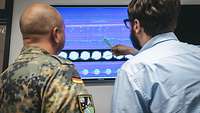
Major Ulrich K. and Yannik P. are analysing current data on solar activity at the Bundeswehr Space Command
Bundeswehr/Marvin Hofmann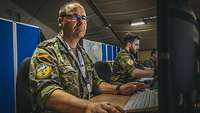
Thomas R. is preparing his daily space weather briefing at the JFACJoint Forces Air Component HQHeadquarters
Bundeswehr/Marvin Hofmann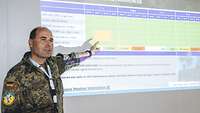
“As space support coordinator, I am the person of contact for issues regarding the availability of space services throughout the exercise area”, says Thomas R.
Bundeswehr/Marvin Hofmann
Yannik P. is analysing data on solar activity at the Bundeswehr Space Command
Bundeswehr/Marvin Hofmann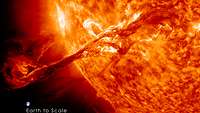
Processes on the Sun can result in coronal mass ejections, in which billions of tons of plasma are hurled into space – find a true-to-scale illustration of Earth at the bottom left.
NASA/GSFC
Multinational air operation exercise in Europe